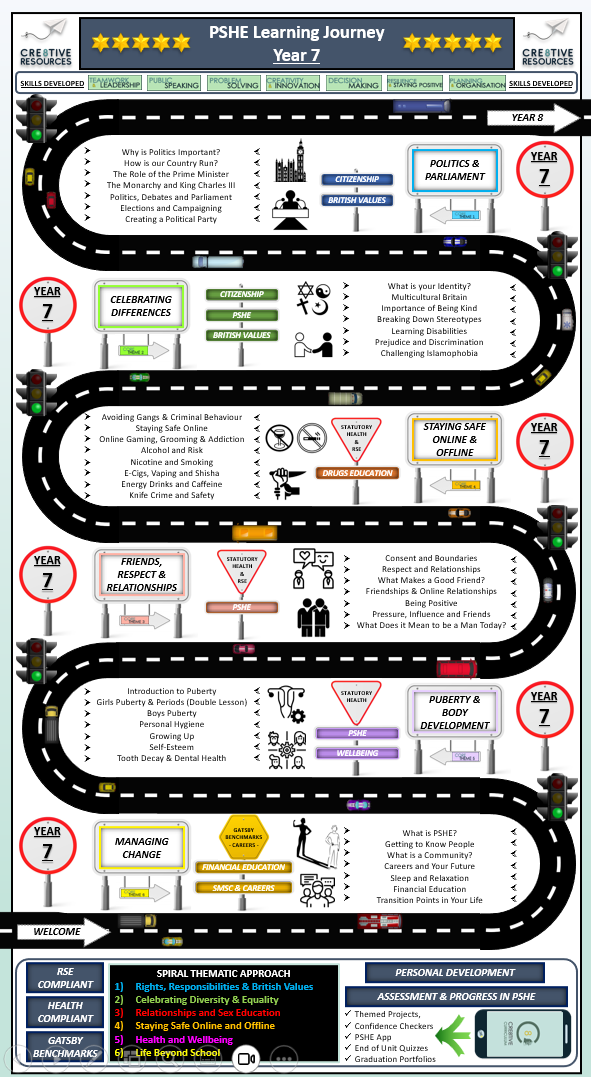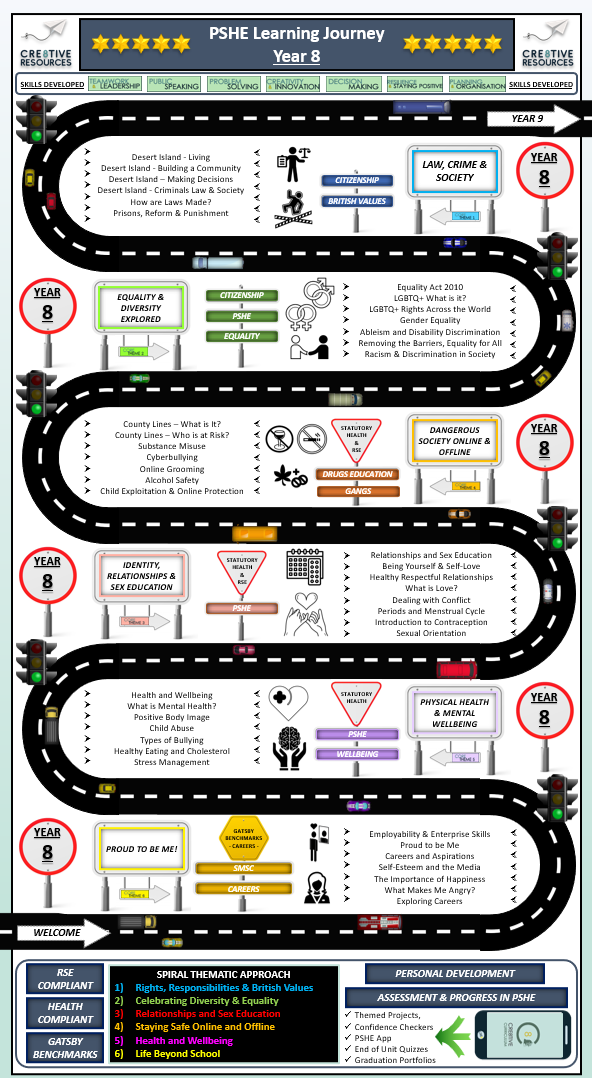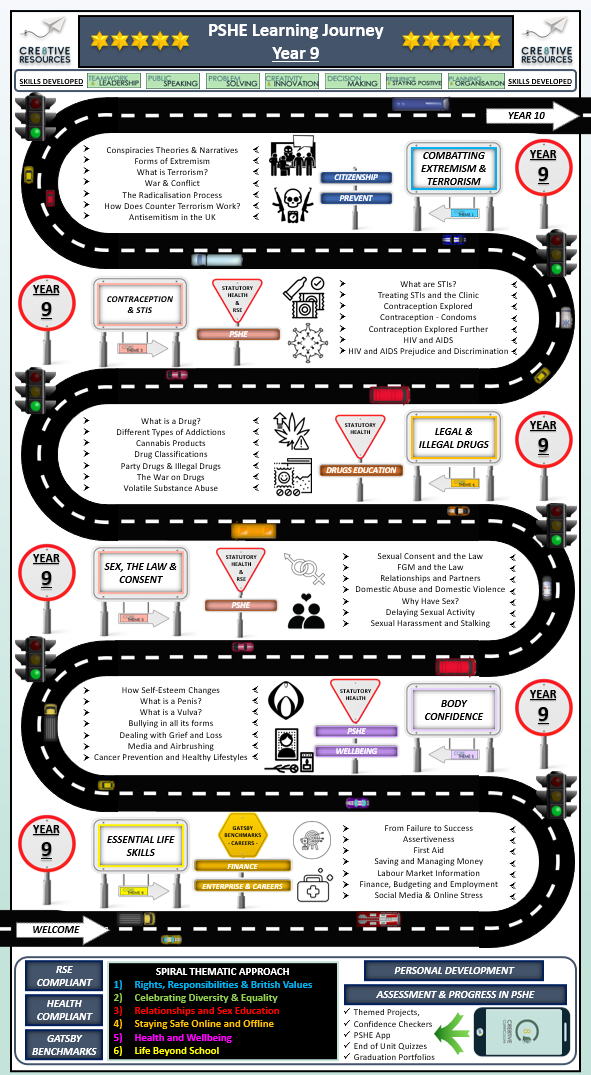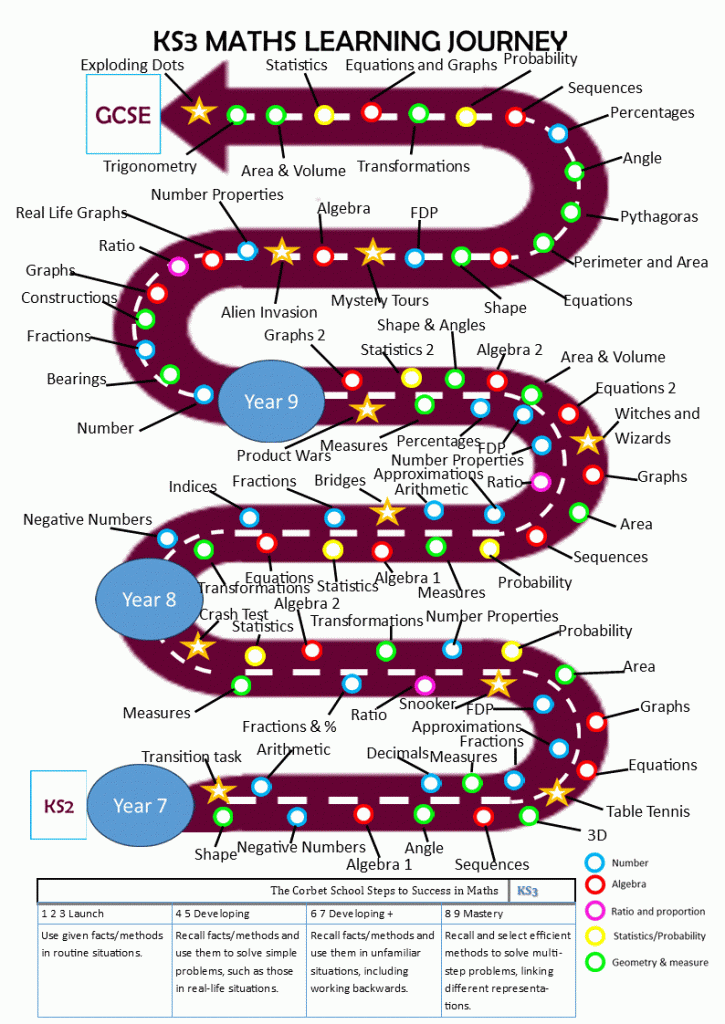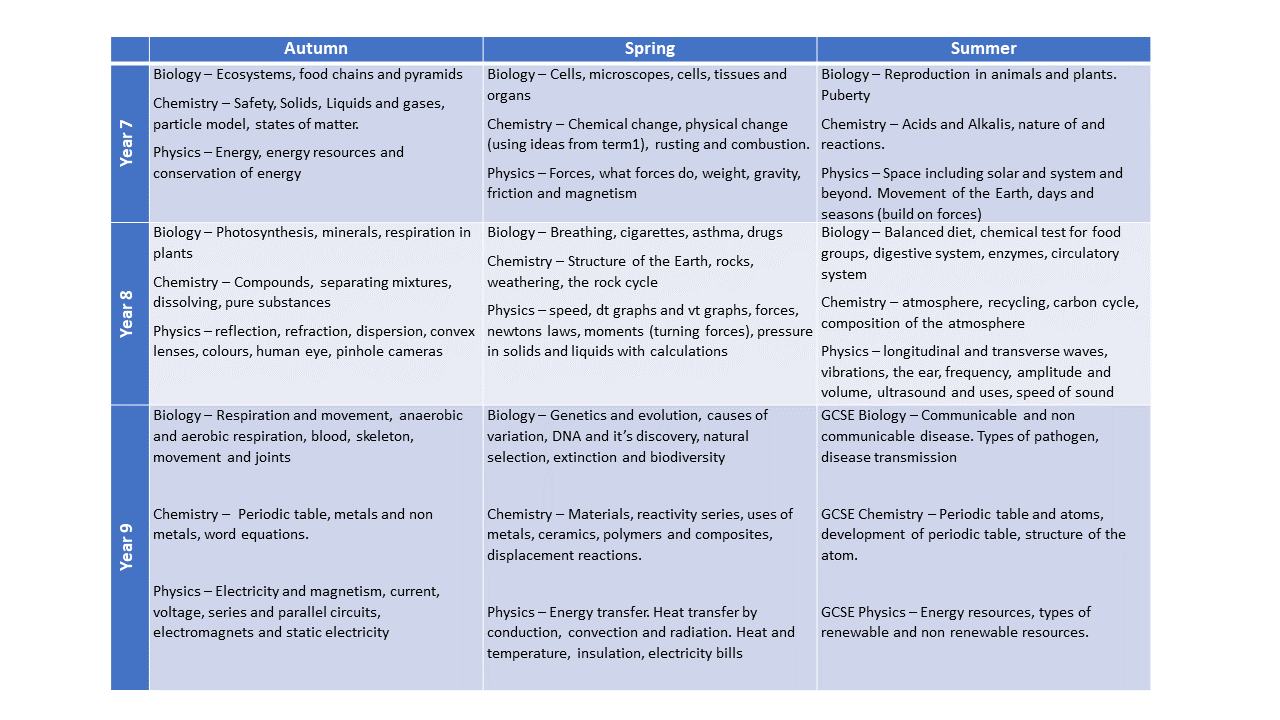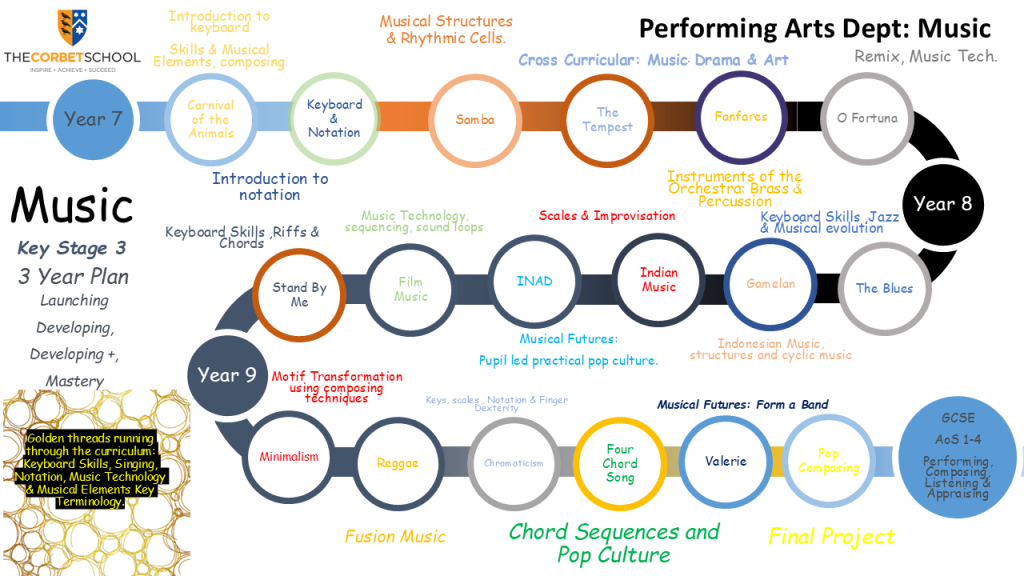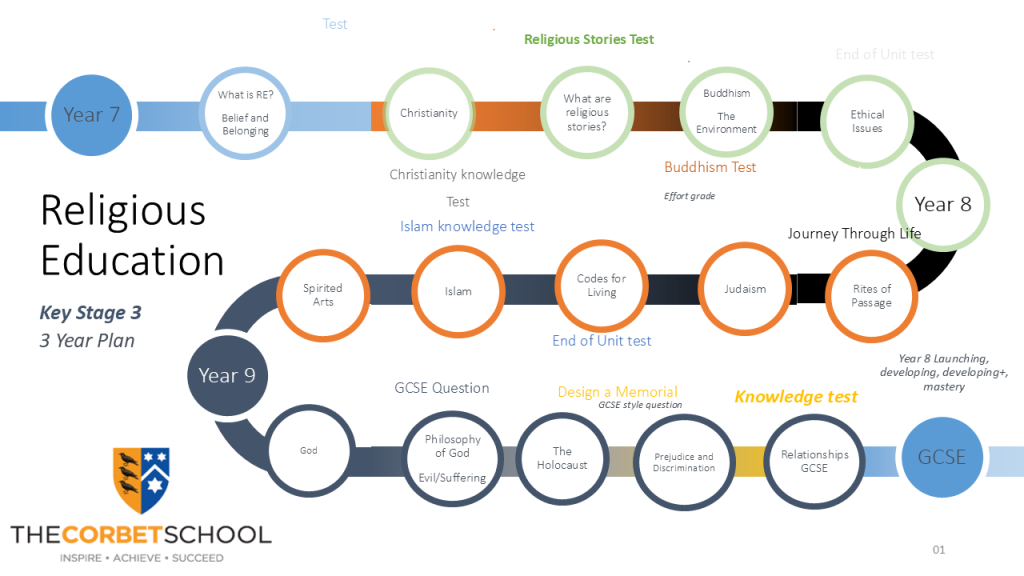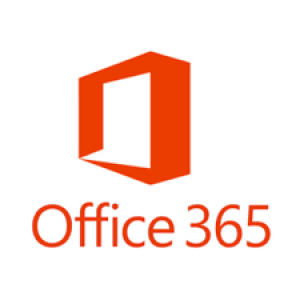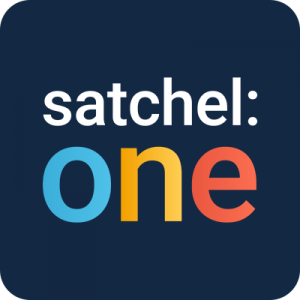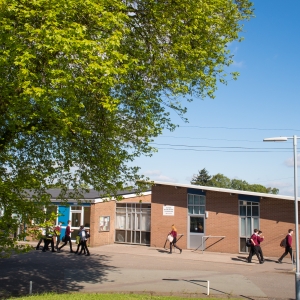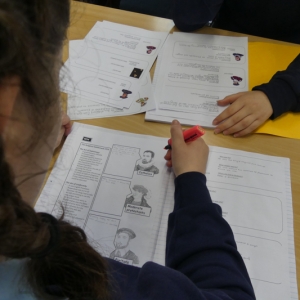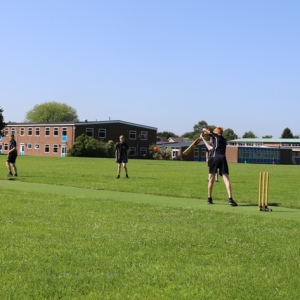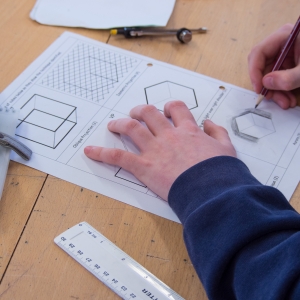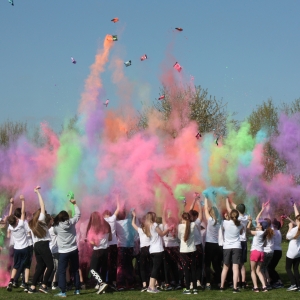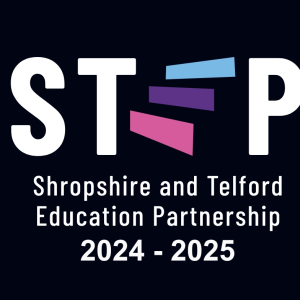During the first three years (7-9) at The Corbet School, all students follow a similar course, designed to give a sound general education and to provide the base upon which the more specialised studies in Years 10& 11.
All pupils in Year 7 will be allocated a language to study (French or Spanish). They will study this one language for the rest of their time at school resulting in a GCSE qualification.
Most lessons in the first two years will be taught in mixed-ability groups. However, the three core subjects; English, Maths and Science will be taught in ability groups.
In year 9, we support students and their parents in making choices from a range of GCSE courses to study in years 10 and 11.
All pupils in KS3 will take: (for further information on topics covered by each subject please click on the subject title):
English Curriculum Intent
English has an essential place in education and in society. A high-quality education in English will teach pupils to speak and write fluently so that they can communicate their ideas and emotions to others, and through their reading and listening, others can communicate with them.
Through reading in particular, pupils have a chance to develop culturally, emotionally, intellectually, socially and spiritually. Literature, especially, plays a key role in such development. Reading also enables pupils both to acquire knowledge and to build on what they already know. All the skills of language are essential to participating fully as a member of society and we support all pupils in their journey to becoming effective communicators.
At The Corbet School we strongly believe in promoting these values, as well as endorsing a love of the subject and encouraging pupils to become confident and independent life-long learners.
Year 7
Autumn term 1 – Childhood
Students look at a variety of extracts from authors such as Charles Dickens and Laurie Lee exploring how childhood memories can be communicated through literature.
Autumn term 2– Fairytales
Students identify features of fairytales and explore Roald Dahl’s revolting rhymes.
Spring term– Nature
Students study a variety of texts based on nature, reading the set text ‘October October’.
Summer term – Etymology and Shakespeare's Legacy
This topic explores why Shakespeare is still relevant, and the lasting effect he has had on our language.
Year 8
Autumn term – Gothic.
Students explore the creation of the genre, influential texts such as Shelley’s Frankenstein and create their own gothic-inspired short stories.
Spring term – Conflict
Students read and analyse some of the most powerful pieces of poetry that survived wars from both past and present. They will also complete an author study on Wilfred Owen and learn about how his encounters with established writers such as Sassoon shaped his writing.
Summer term – Villians.
What makes the perfect villain? In this unit students analyse the conventions of villainous characters, focusing on Sherlock Holmes.
Year 9
Autumn term – Out of this World.
Dystopian fiction is an ever growing genre; this unit provides the opportunity for students to learn about the conventions of the genre as well as completing a film study to see how these features can be communicated through film.
Spring term – Journeys
During this unit students study a text that explores a character’s journey to finding their new life. They will look at a variety of themes such as discrimination, identity and modern life.
Summer term – Relationships
During this unit students explore a broad range of text types such as prose, poetry and scripts. Influential relationships in fiction are analysed including Miss Havisham’s life of isolation and Romeo & Juliet’s romance and the conflicts they experience with their families.
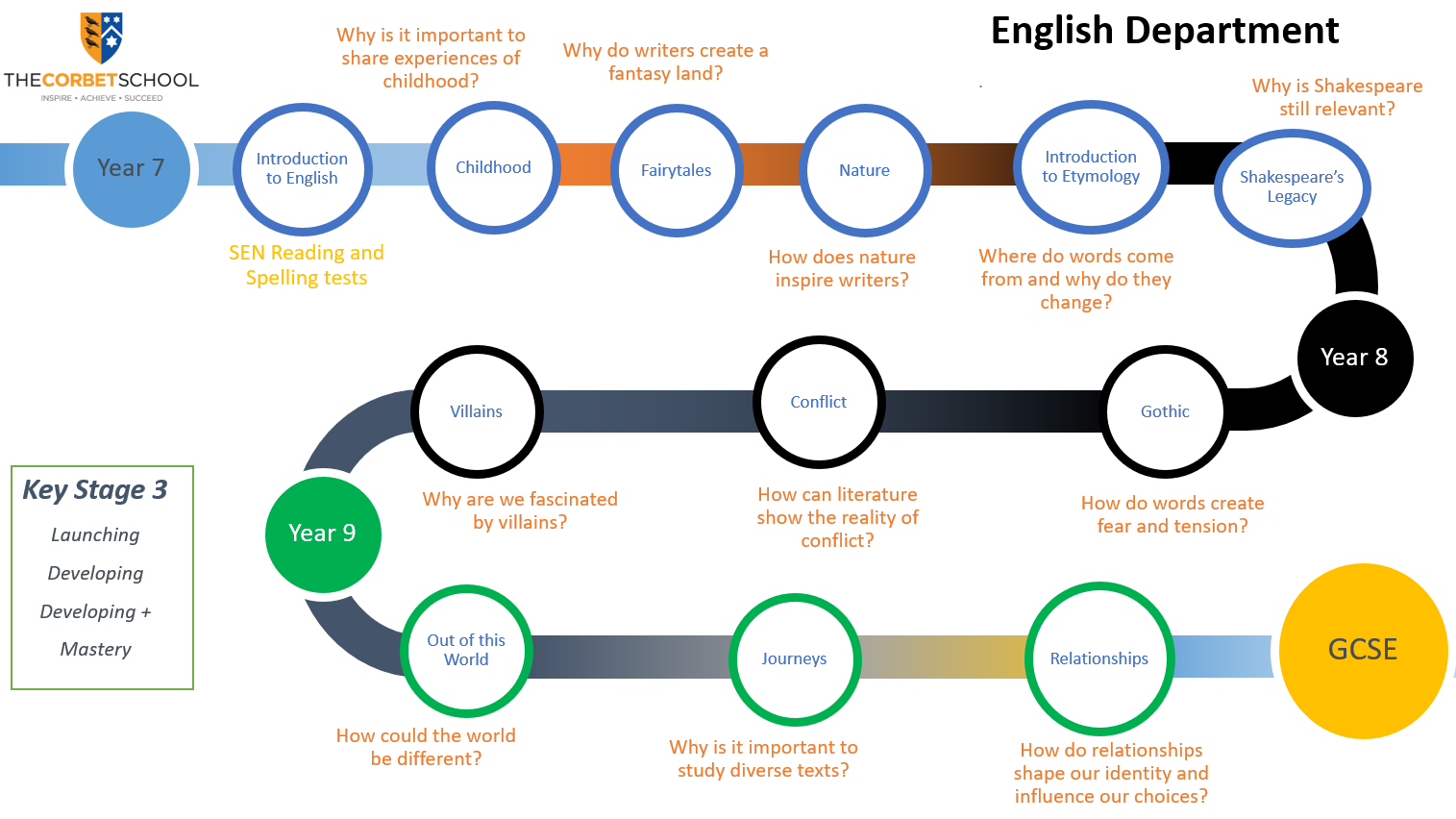
Intent
The curriculum:
- builds on prior knowledge from KS2, ensures that skills are developed in all years and prepares pupils for GCSE
- develops fluency, deep conceptual understanding and connections within Mathematics, allowing learning to be embedded
- enables all pupils to function mathematically in day to day life
- stretches the most able pupils
- develops pupils as independent, resilient learners
- ensures that all pupils have range of learning experiences
- ensures consistency across the department in terms of content and approaches
Year 7
| 7 | Topic | Intent | Number Topic | Intent |
| Autumn | Shape | Pupils will learn the names and properties of 2D and 3D shapes, and labelling conventions for properties. They will learn to recognise similar and congruent shapes. | Sweets in a Box | Pupils will work on the key stage 2/3 transition task. They will develop their ability to reason mathematically and solve problems. |
| Negative Numbers | Pupils will learn how to use double-sided counters to make zero pairs. They will be able to add and subtract with negative numbers using the double-sided counters as a model while considering the additive inverse. | Arithmetic | Pupils will solve problems involving addition, subtraction, multiplication and division of integers. They will use place value to order decimals and multiply by powers of 10. | |
| Algebra 1 | Pupils will write expressions and consider multiple representations of these such as bar models and function machines. They will substitute values into these representations. | Decimals | Pupils will add, subtract, multiply and divide with decimals, using the order of operations. | |
| Angle | Pupils will practice estimating, measuring and drawing angles and they will learn to construct triangles. They will use basic angle facts to solve problems involving missing angles. Pupils will also learn about bearings and their relation to compass points. | Fractions | Pupils will use their knowledge of fractions to find equivalent fractions, simplify and convert between mixed numbers and improper fractions. They will add, subtract, multiply and divide a fraction by a fraction. | |
| Sequences | Pupils will continue and generate simple sequences. They will use function machines to find connections between variables and then use their previous learning to write these connections in algebra, leading to finding and using the nth term. | |||
| 3D | Pupils will find the volume of cubes and cuboids and will use isometric paper to draw these shapes in 3D. They will also draw plans and elevations of other 3D shapes. | |||
| Table Tennis | In this investigation pupils will work logically to organise a table tennis tournament in the most efficient way. | |||
| Spring | Equations | Pupils will form equations using the multiple representations covered in Algebra 1 and will use inverses to solve them. They will use algebra tiles to support the solving of equations with unknowns on both sides and introduce balancing. | Approximations | Pupils will round to the nearest 10, 100, 1000, whole number and decimal places. |
| Graphs | Pupils will interpret and sketch graphs modelling real life situations. They will use relationships in coordinates to find rules for straight line graphs. | Fractions, Decimals and Percentages | Pupils will convert between equivalent fractions, decimals and percentages. | |
| Area | Pupils will find the area of rectangles, triangles, parallelograms and compound shapes. They will investigate the ratio between the diameter and circumference of a circle and practise finding the circumference of circles. | Ratio | Pupils will learn to express, simplify and find equivalent ratios. They will share in a ratio and solve problems involving direct proportion. | |
| Probability | Pupil will be introduced to the probability scale and they will use equally likely outcomes to find the probability of a single event. | Snooker | In this investigation pupils will look for patterns in the number of touches a snooker ball makes and which pocket it lands in for different size tables. | |
| Number Properties | Pupils will learn about the properties of whole number including square, cube and triangular numbers, multiples, factors and primes. They will find the HCF and LCM of two numbers and be able express a number as a product of its prime factors. | |||
| Summer | Transformations | Pupils will reflect, rotate and translate shapes. They will identify reflection and rotational symmetry in 2D shapes. | Fractions and Percentages | Pupils will calculate fractions and percentages of amounts. |
| Algebra 2 | Pupils will form and substitute into expressions. They will use algebra tiles to represent expressions and they will simplify expressions by collecting like terms. | |||
| Statistics | Pupils will calculate averages and range and draw and interpret tally, bar and simple pie charts. | Measures | Pupils will solve problems involving money and time | |
| Crash Test | In this investigation pupils will use skills that they have learnt in the Statistics topic to make and test a hypothesis. |
Year 8
| 8 | Topic | Intent | Number Topic | Intent |
| Autumn | Transformations | Pupils will identify reflectional and rotational symmetry in shapes. They will build on the reflection, rotation and translation work covered in year 7 and learn to enlarge shapes with both integer and fractional scale factors. | Negative Numbers | Pupils will add, subtract, multiply and divide positive and negative integers and decimals. |
| Equations 1 | Pupils will build on their work on balancing equations to include unknowns on both sides where the unknowns may be negative. | Indices | Pupils will be able to evaluate indices and they will know the laws of indices for multiplication and division. | |
| Statistics 1 | Pupils will draw and interpret two-way tables, frequency trees, pie charts and scatter diagrams. They will use lines of best fit to make predictions. | Fractions | Pupils will simplify and find equivalent fractions. They will order and compare fractions and find fractions of amounts. Pupils will add, subtract, multiply and divide fractions and mixed numbers. | |
| Algebra 1 | Pupils will substitute positive and negative numbers into expressions involving powers and roots. They will build on previous work to enable them to simplify expressions involving more than one bracket. Pupils will learn how to factorise an expression by taking out a common factor. | Arithmetic | Pupils will know the equivalence between multiplying/dividing by 0.1/0.01 and dividing/multiplying by 10/100. Pupils will review adding, subtracting and multiplying decimals by decimals, and dividing decimals by integers. | |
| Measures | Pupils will convert between metric measures of mass and capacity, and use these to solve problems. | Bridges | Pupils will investigate the effect of changing the height and arch of a simple bridge shape on the number of cubes need to build it. They will express their findings using diagrams, words and algebra. | |
| Spring | Probability | Pupils will build on their knowledge about single events to find p(not A). They will use lists and sample space diagrams to calculate the probability of combined events and they will learn how to estimate the number of expected outcomes for both single and combined events. Pupils will calculate probability from frequency trees, two-way tables and Venn diagrams. | Approximations | Pupils will review rounding to decimal places and extend their knowledge to include rounding to significant figures. Pupils will use significant figures to estimate calculations. |
| Sequences | Pupils will review and build on their knowledge about sequences by using geometric structures to justify the nth term. | Ratio | Pupils will develop their understanding of multiplicative relationships and use these to simplify and share in a ratio. They will extend their knowledge of proportion to include the properties of the graph. Pupils will calculate with speed, distance and time. | |
| Area | Pupils will extend their learning about circumference to include shapes made from semi-circles. Pupils will build on their area knowledge to include finding the area of trapeziums and they will derive and use the formula for the area of a circle. Pupils will find the area of compound shapes. | Number Properties | Pupils will learn to describe and identify inequalities on a number line. They will review multiples, factors and primes. | |
| Graphs 1 | Pupils will review and build on their knowledge of coordinates on straight line graphs and they will link this to number patterns. They will extend real life graphs to include distance/time graphs. | |||
| Witches and Wizards | In this investigation pupils will use skills that they have learnt in the Number Patterns, Algebra and Graphs topics to reason mathematically and solve problems. | |||
| Equations 2 | Pupils will extend their knowledge of solving equations to those including brackets. | |||
| Summer | Area and Volume | Pupils will build on their knowledge of area and perimeter to include parts of circles. They will calculate the surface area and volume of a prism. | Fractions, Decimals and Percentages | Pupils will convert between fractions, decimals and percentages. They will use equivalences to express proportion as a fraction, decimal or percent. |
| Algebra 2 | Pupils will build on their knowledge of expanding brackets to include expanding and simplifying the product of two binomials. The will derive fact families from a given formula and factorise expressions by taking out a common factor. | Percentages | Pupils will build on efficient methods to calculate percentages of amounts to increase/decrease by a percentage. | |
| Shape and Angle | Pupils will build on their knowledge of angles to include calculating angles in quadrilaterals and they will solve problems involving parallel lines. They will build on the properties of quadrilaterals to include diagonals. | Product Wars | Pupils will use statistics to research and design a smoothie and its packaging. | |
| Statistics 2 | Pupils will learn about the difference between discrete and continuous data and will draw frequency polygons and histograms of grouped data. They will extend their knowledge of averages to enable them to calculate averages from a frequency or grouped frequency table. | |||
| Graphs 2 | Pupils will extend their knowledge of straight line graphs to use the gradient and y-intercept to find the equation of a straight line and they will plot simple quadratic graphs. |
Year 9
| 9 | Topic | Intent |
| Autumn | Number | Pupils will review rounding and extend this to expressing error intervals. They will solve problems involving adding, subtracting, multiplying and dividing with mixed numbers, decimals and negative numbers. |
| Bearings | Pupils will build on their knowledge of bearings and use them to fix a position. They will draw and read scale drawings and link these to bearings. | |
| Fractions | Pupils will review fraction arithmetic. They will solve problems involving adding, subtracting, multiplying and dividing with mixed numbers. | |
| Constructions | Pupils will use compasses and protractors to construct triangles and relate these to the conditions for congruence. They will use compasses to construct bisectors and perpendiculars and use these to accurately construct loci. | |
| Graphs | Pupils will substitute into formulae to plot linear and quadratic graphs and will use these graphs to solve simple equations. They will be able to find the equation of a straight line. | |
| Ratio | In this topic pupils will build on their previous work on ratio to include using proportion to find best buys and to solve problems involving inverse proportion. They will extend their knowledge of compound units to include density. | |
| Real Life Graphs | Pupils will interpret and draw graphs modelling real life situations including distance-time graphs. They will develop their understanding of gradient as a rate of change. | |
| Number Properties | Pupils will review and extend the laws of indices to include raising a power to a power. They will learn to express numbers in standard form. | |
| Alien Invasion | Pupils will use their knowledge from across a range of topics to solve a problem in context. | |
| Spring | Algebra | Pupils will review expanding and simplifying expressions involving brackets and they will extend their knowledge of factorisation to include quadratic expressions. |
| Fractions, Decimals and Percentages | Pupils will review equivalent fractions, decimals and percentages, and extend their knowledge about expressing a proportion to include expressing change as a fraction, decimal or percent. | |
| Mystery Tours | In this task pupils will plan a tour around the UK, using their math skills to keep their customers happy. | |
| Shape | Pupils will review the names and properties of 2D shapes. Pupils will use isometric paper to draw 3D shapes including those that are not cuboids. They will construct nets of cuboids and other shapes. | |
| Equations | Pupils will review solving linear equations and extend this to include forming equations. They will learn to use balancing to solve inequalities and to rearrange formulae. | |
| Perimeter and Area | Pupils will review and then extend their knowledge of area and perimeter to include arc length and area of a sector. | |
| Pythagoras | Pupils will investigate Pythagoras’ Theorem and use this to find missing lengths in right-angled triangles. | |
| Angle | Pupils will review all of the basic angle facts and learn about interior and exterior angles in polygons. | |
| Summer | Percentages | Pupils will build on their knowledge of percentages to use multipliers to calculate percentage change. They learn to solve reverse percentage problems. |
| Sequences | Pupils will review their knowledge of linear, geometric and Fibonacci type sequences and extend this to use geometric properties to find and justify the nth term of quadratic sequences. | |
| Probability | Pupils will learn set notation for Venn diagrams and connect this to their knowledge of the probability of AND, OR and NOT. | |
| Transformations | Pupils will review reflection, rotation, translation and enlargement and will extend this to describe a combined transformation as a single transformation. | |
| Equations and Graphs | Pupils will use their knowledge of plotting graphs to solve simultaneous equations and they will begin to develop an algebraic approach to solving linear simultaneous equations. | |
| Statistics | Pupils will review pie charts and scatter-diagrams and will learn about the issues with extrapolation. They will review calculating averages, including from grouped data. | |
| Area and Volume | Pupils will review finding the volume of a prism and cylinder and will extend surface area to include cylinders. | |
| Trigonometry | Pupils will investigate the trigonometric ratios and will use these to find missing sides and angles in right-angled triangles. | |
| Exploding Dots | In this investigation pupils will use explore different base numbers. |
KS3 Maths Learning Journey
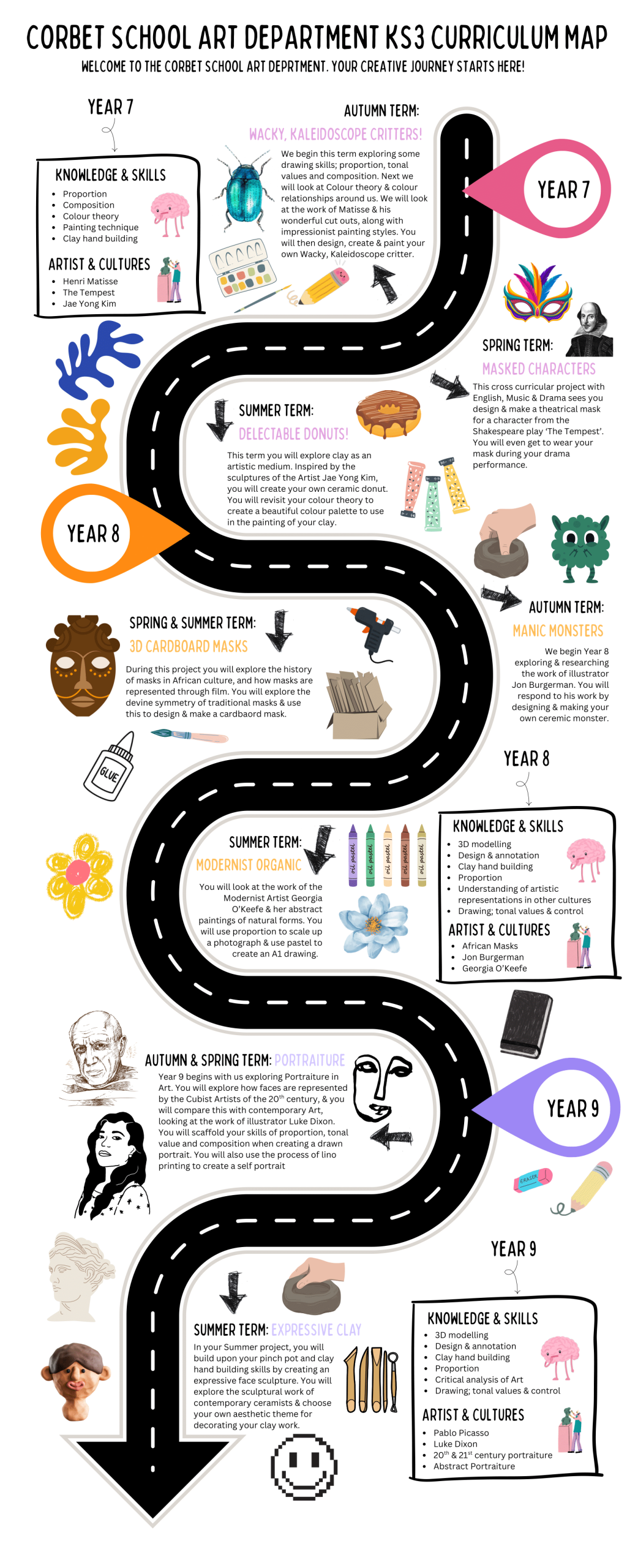
The year 7 computing topics are as follows –
- Digital Literacy
- E-Safety
- Spreadsheets
- Introduction to Computer Science
- Programming with Microbits
The year 8 computing topics are –
- Computer Crime and Cyber Security
- Networks
- Algorithms
- Programming in Small Basic
- Game Making / Programming / with Microbits
The year 9 computing topics are –
- Networks
- Algorithms
- Programming in Python
- Video and Sound Editing
- Office & Web Searching Skills
Year 7: In Year 7, students are introduced to the foundational skills across Food, Textiles, and Design & Technology. They explore basic cooking techniques, sewing methods, and workshop safety while developing creativity, problem-solving, and practical skills. The focus is on building confidence, understanding materials, and learning how to communicate design ideas effectively.
Food
In Year 7, students develop basic cooking skills. Topics include food hygiene, health and safety, energy requirements, chemical reactions in food production, seasonality, and food provenance. Students will cook a variety of savoury and sweet dishes, with an emphasis on eating a healthy, balanced diet.
Textiles – Cushion Project
Students are introduced to textiles through a variety of hand and machine sewing techniques and finishes. They will also learn about health and safety, market research, and design skills to create a decorative cushion.
Design and Technology
- Wooden Truck Project
Pupils are introduced to the workshop environment, learning about health and safety and a range of woodworking tools and equipment. They will develop basic design communication skills, including sketching, drawing controlled lines, 3D sketching, annotation, and highlighting key features to effectively communicate their ideas. They will manufacture a wooden truck, applying their newly acquired knowledge.
- Travel Game
Students will design and make a travel game based on a theme of their choice. They will research and develop a design brief and specification, then generate and annotate design ideas. Pupils will learn about the properties and uses of various timbers, manufactured boards, and plastics.
- Metal Key Tag
Students will design and make a metal key tag using a range of metalworking tools and equipment. They will also learn about the properties and uses of metals and alloys.
Year 8: Year 8 builds on the skills and knowledge from Year 7, encouraging students to deepen their understanding of materials, nutrition, and user-focused design. Projects become more complex, and students begin to explore ergonomics, electronics, and more advanced textile techniques.
Food
Building on the skills taught in Year 7, students will learn about the function of nutrients in the diet and the importance of maintaining a healthy, balanced diet. The focus will be on protein and carbohydrates, as well as the impact of nutrient deficiencies. Students will enhance their practical skills by preparing more complex dishes.
Textiles – Ugly Doll Project
Pupils will build on their Year 7 skills to research, design, and make a cuddly toy inspired by the "Ugly Doll" concept. They will explore the properties of materials and place greater emphasis on design work and pattern making.
Design and Technology
- Bottle Opener
Pupils will further develop their metalworking skills by designing and making a bottle opener. They will model and test their designs to create an ergonomically designed handle, then manufacture the metal component using heat treatment techniques. This project focuses on user-centred design.
- Bluetooth Amplifier
Pupils will research, design, make, and evaluate a Bluetooth speaker. They will analyse existing products for inspiration, produce a detailed design specification, and use modelling to refine their ideas. Pupils will work with a range of materials and be introduced to electronics and soldering to build their Bluetooth circuit.
Year 9: In Year 9, students consolidate their learning from previous years and begin to work more independently. They are given greater creative freedom and are introduced to more advanced techniques and technologies, preparing them for GCSE-level study.
Food
Year 9 food brings together all the skills developed in previous years to create a range of dishes. The focus will be on international cuisine, exploring various cultures, religions, and countries. Pupils will have more freedom to create dishes of their choice. By the end of Year 9, they will have covered the fundamental knowledge required for GCSE Food Preparation and Nutrition.
Textiles – Personal Project (Open Brief)
Students will apply a variety of creative techniques and build on their previous textiles experience. They will choose an inspirational theme for an open brief, similar to GCSE-level work. Through independent research, students will take ownership of their project and develop their creativity. The main focus is on developing an idea and producing a final piece.
Design and Technology
- USB Desk Lamp
Students will design and make a USB-powered lamp based on a chosen theme or design style. They will investigate decorative and functional lighting, develop and model their ideas, and manufacture a final product. Students are encouraged to use the full range of skills developed in Years 7 and 8, including CAD/CAM (Computer-Aided Design and Manufacture).
- Jewellery Design and Packaging
Pupils will develop CAD/CAM skills by designing a laser-cut mould to create a pewter-cast item of jewellery. They will also design and produce packaging, including graphic elements, and evaluate their finished product. This project develops skills in metalworking and refining pewter to a high standard.
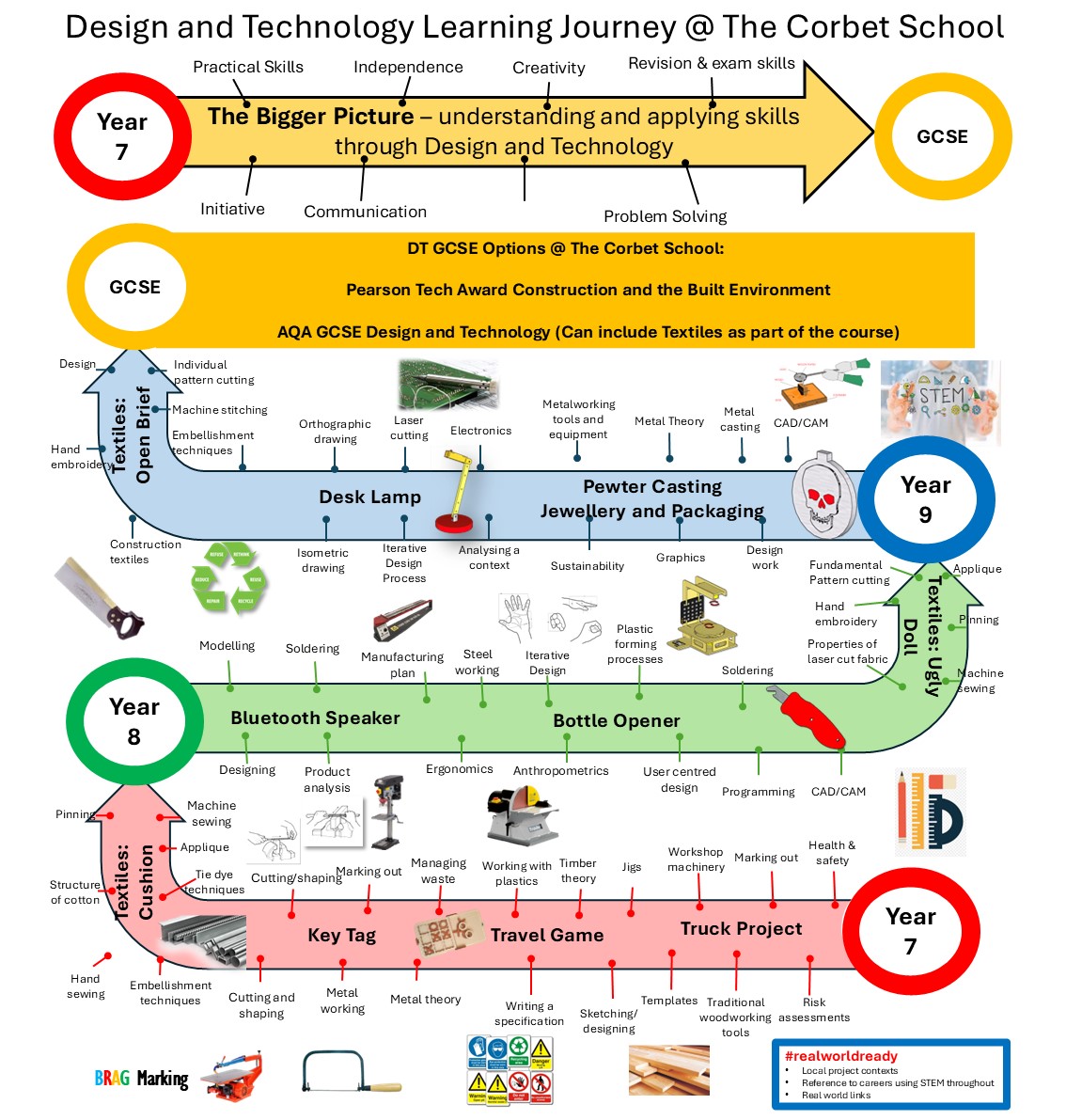
YEAR 7
In year 7 pupil experience units of work on: storytelling (Jack and the Beanstalk); body language; spontaneous improvisation; Rose Blanche; evacuees; using soundscape; and a cross curricular unit with music and art on William Shakespeare’s The Tempest.
YEAR 8
In year 8 pupils experience units of work on: melodrama; pantomime; externalised conscience (Jo); status; David Almond’s the Savage; using tableaux to stimulate performance.
Year 9
In year 9 pupils experience units of work on: soap opera; Greek theatre; Hillsborough; The First World War; ritual drama; Shakespeare’s The Seven Ages of Man speech from As You Like It; mountain language (based on Harold Pinter); protest and persuasion; and, Charles Causley’s What Has Happened to Lulu. In year 9 pupils will also produce their own final piece of drama based on a stimulus.
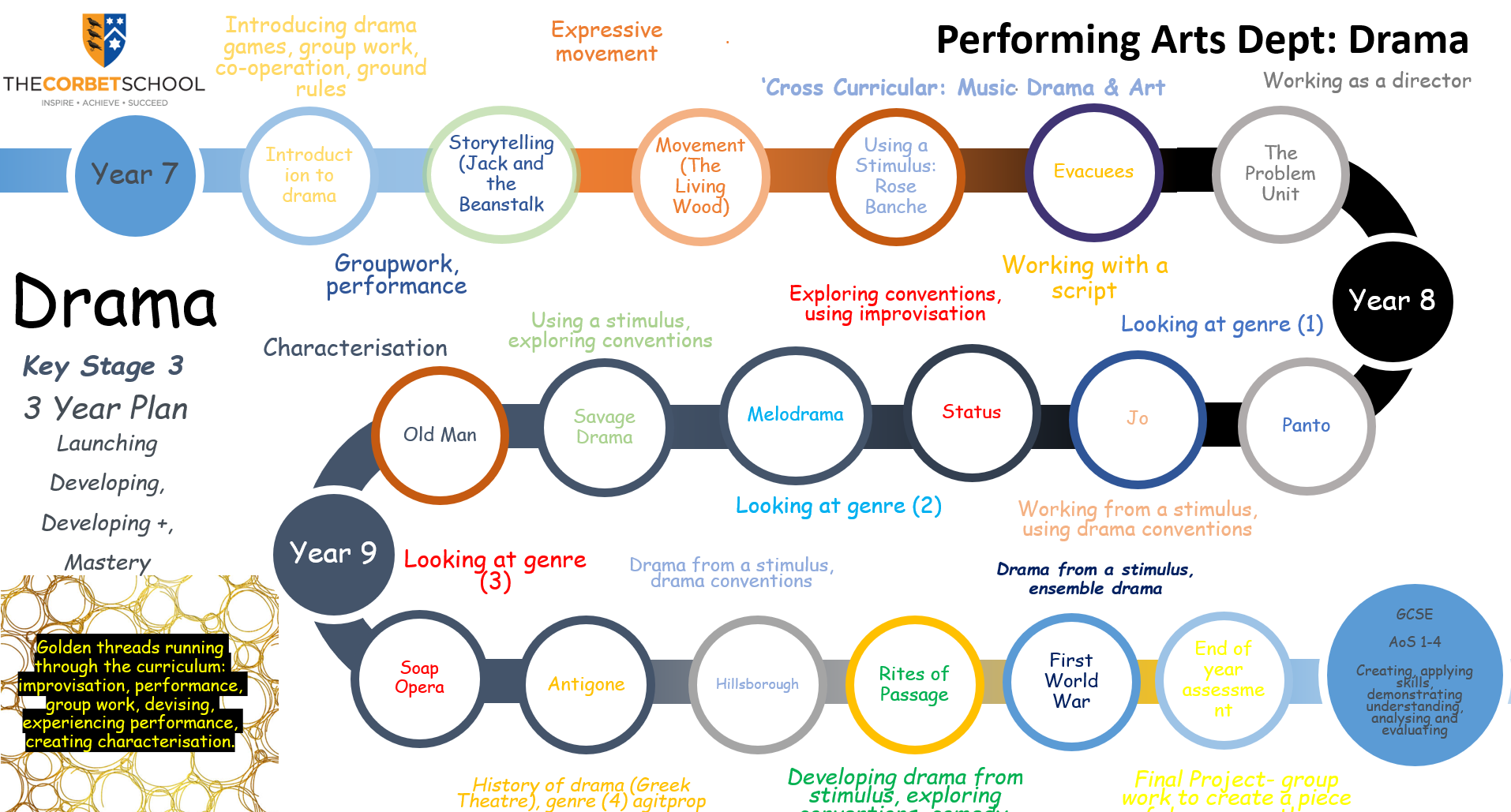
Year 7
Monarchs, Monks and Migrants
Exploring the origins of Britain through the monarchy, church and migration of peoples.
Year 8
Cavaliers, Colonies and Coal
Looking at English Civil war, British expansion around the world including the slave trade and the industrial revolution.
Year 9
Trenches, Treaties and Terror
Exploring the First World War, looking at the 1930's and the emergence of extreme regimes in Europe which led to WWII and looking at the events of the Second World War.
The year 7 Geography topics are as follows –
- Map & Atlas Skills
- Rocks & Resources
- The UK
- The Rural Environment
- Rivers
- Enquiry Skills
The year 8 Geography topics are –
- Europe
- Weather & Climate
- Population Change
- Ice on the Land
- Volcanoes & Earthquakes
- Tourism
The year 9 Geography topics are –
- Globalisation
- Coasts
- The Development Gap
- Middle East
- Ecosystems
- Urban Environments
KS3 Geography Pathway
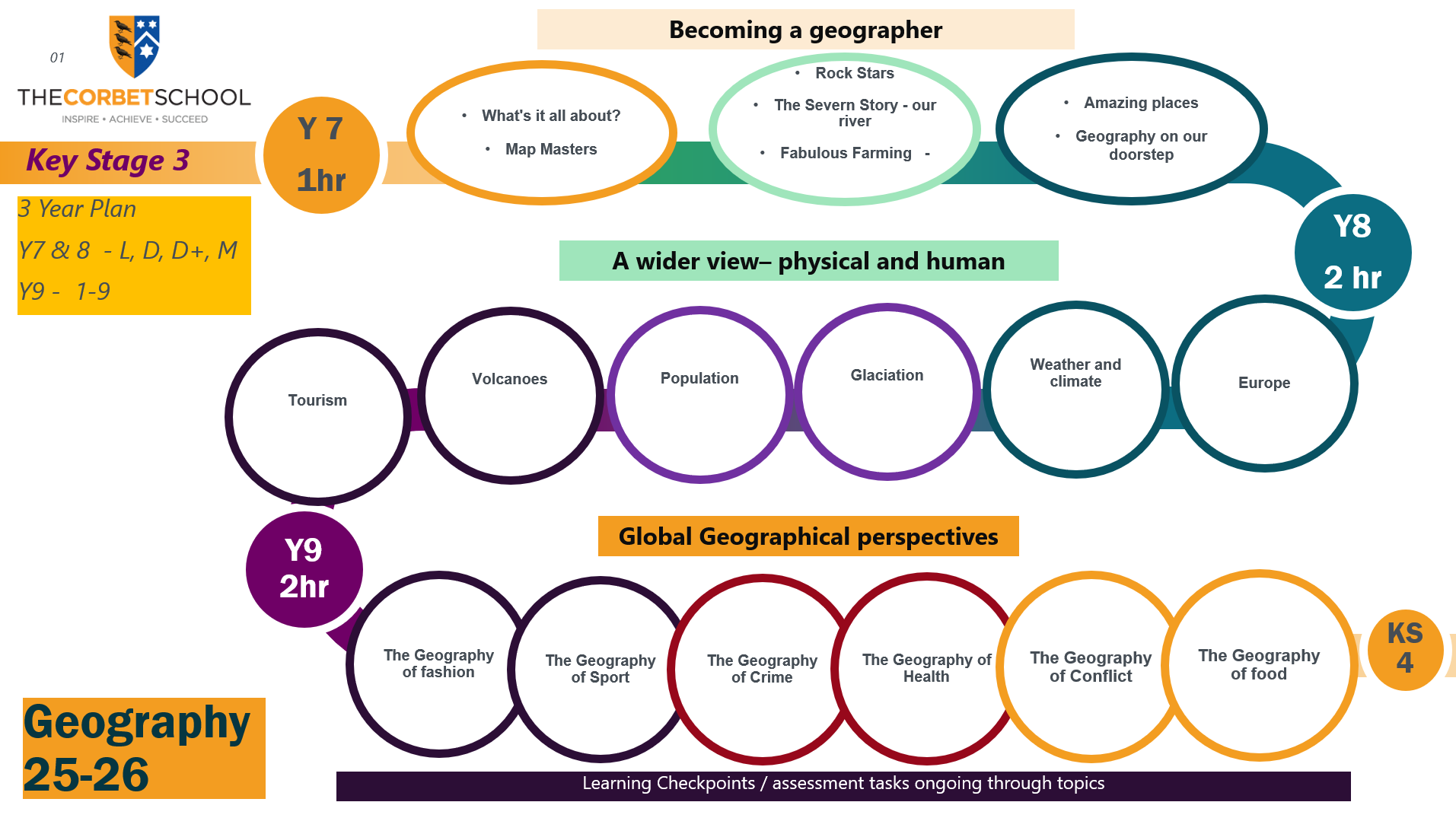
The MFL Curriculum at the Corbet School
All pupils in Year 7 will be allocated a language to study (French or Spanish). They will study one language for the rest of their time at school resulting in a GCSE qualification at the end of Year 11.
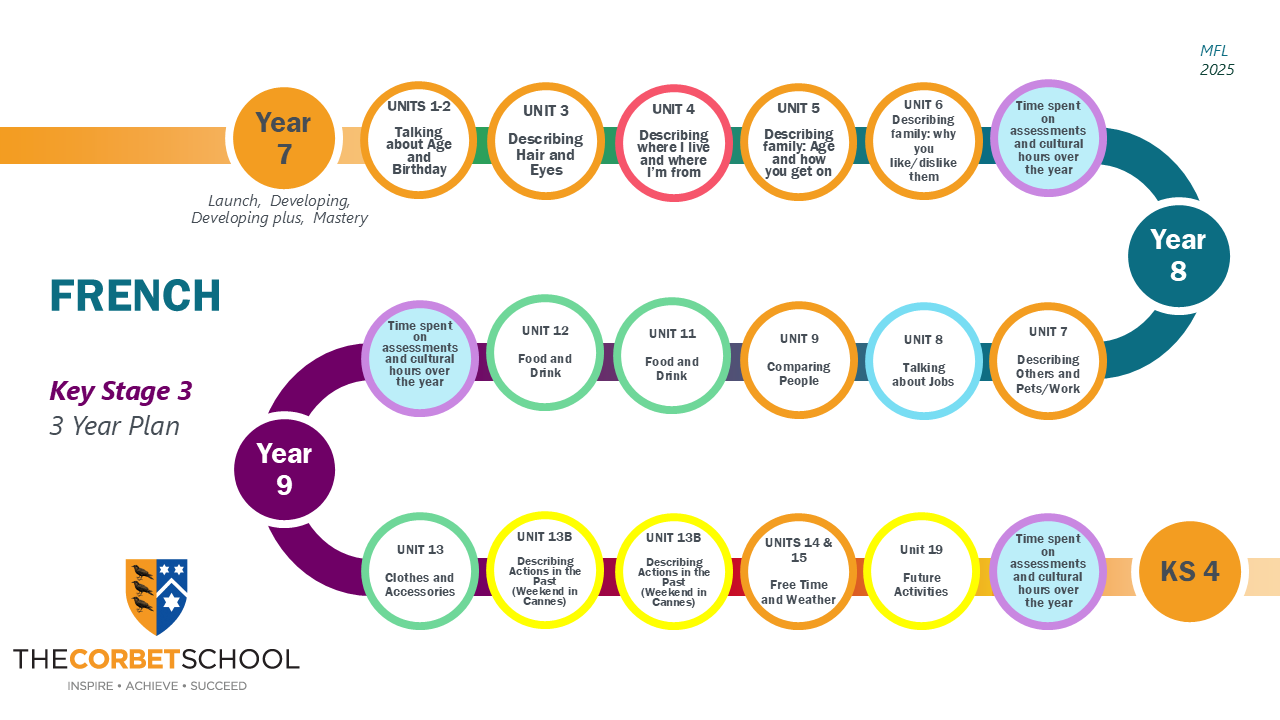
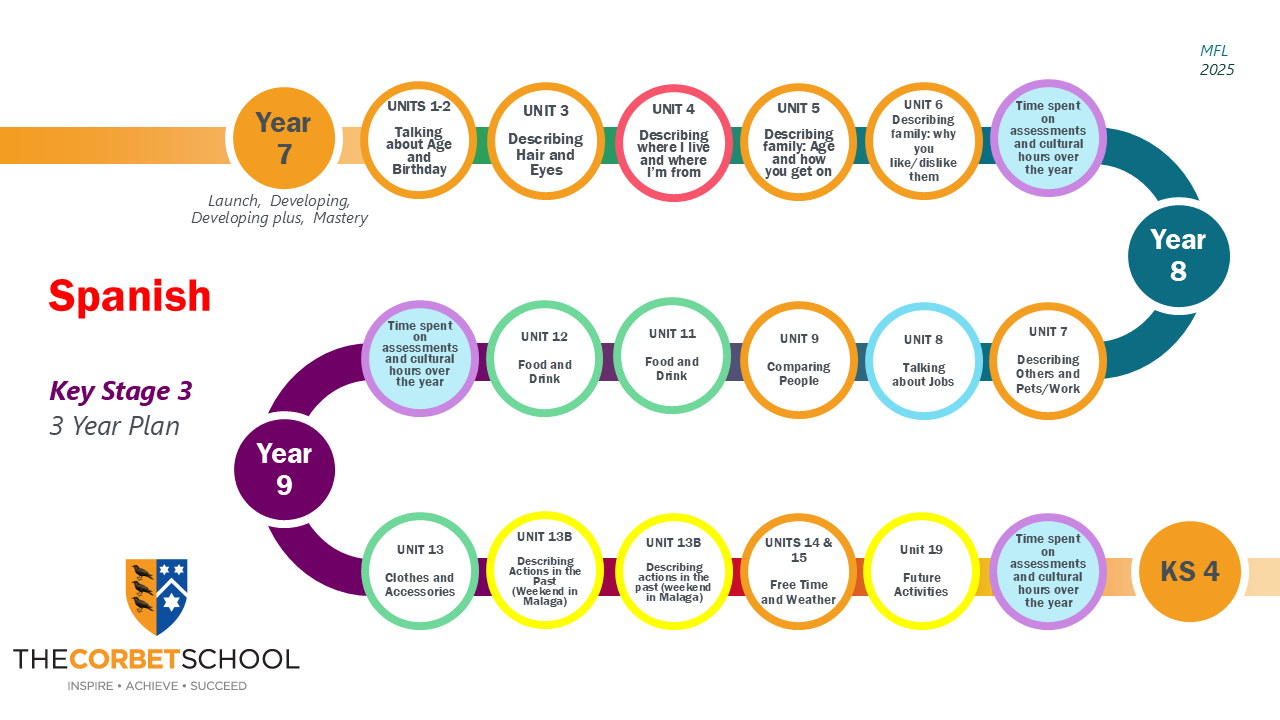
KS3 Overview
A streamlined selection of key language patterns will be taught with an emphasis on repetition, recycling, and rehearsing with most teaching and learning activities linked to sentence builders. Pupils will learn phrases or chunks with a long-term aim of internalising the target language. Listening and reading activities (receptive skills) will be used to introduce new language patterns. Speaking and writing activities will consolidate and strengthen these new structures, with a view to pupils being able to speak and write with greater spontaneity and confidence (productive skills).
Interleaving (referring to key language patterns and chunks on a regular basis) will be an essential part of teaching, giving pupils plenty of opportunity to recycle language from parts of the term or year. Teachers will follow Dr Gianfranco Conti’s MARSEARS approach of EPI (Extensive Processing Instruction) over the course of years 7 to 9. This means focusing on patterns and chunks of language, rather than isolated words and grammar rules. Thus, the aim of our curriculum design is increased spontaneity and internalisation of language.
Homework and revision website link: Language Gym - Home
The music curriculum at The Corbet School is designed to:
- engage and inspire pupils to develop a love of music through broad, balanced and comprehensive study.
- increase self-confidence, creativity and sense of achievement.
- allow pupils to develop a critical engagement with music.
Specifically, lessons are structured for pupils to:
- perform, listen to, review and evaluate music across a range of historical periods, genres, styles and traditions.
- develop their vocal and instrumental skills (solo & ensemble) with a focus on fluency, accuracy and expressiveness.
- create and compose music on their own and with others.
- use technology appropriately
- understand and explore how music is created, produced and communicated from a range of composers and musicians
- become familiar with the musical elements: pitch, duration, dynamics, tempo, timbre, texture, structure and appropriate musical notations in a range of genres and traditions.
A range of extracurricular activities are available throughout the week that pupils can attend to further their musical experiences at The Corbet School. Performance platforms occur throughout the year to allow pupils to develop their confidence to perform and raise the profile of the subject amongst the student body. All pupils are given the opportunity to learn a musical instrument should they wish to do so.
KS3 Music Road Map:
Intent statement:
At The Corbet School, the PE department aims to provide a program of study that provides a positive learning experience for all students to achieve their full potential and develop a sense of belonging. The department aims to maintain/stimulate student interest and enjoyment in Physical Education and to promote health and fitness for current and future lifestyles. The curriculum is broad, balanced and inclusive, providing pupils with an enjoyable, safe and challenging experience. Students’ will develop physical and social skills, and personal confidence. Opportunity is provided for students’ to develop teamwork, leadership and organisation skills, responsibility, and self-awareness. Positive attitudes and bravery are encouraged through personal challenge and students develop an understanding of moral values, trust and respect for others and sporting etiquette. The development of self-esteem is supported through improving physical confidence and resilience by helping students cope with both success and failure in competitive and co-operative activities. Students are provided with the knowledge and awareness of career opportunities that link with physical education. The department aims to offer a variety of extra-curricular activities for students to further develop their talents and interests.
Year 7
Students will receive 2 lessons a week and will follow a varied curriculum across the year, which may include some or all of the following activities and sport:
- Netball
- Football
- Rugby
- Handball
- Flag football
- Fitness
- Basketball
- Gymnastics
- Tennis
- Table Tennis
- Rounders
- Cricket
- Athletics
Year 8
Students will receive 2 lessons a week and will follow a varied curriculum across the year, which may include some or all of the following activities and sport:
- Sports Leadership
- Netball
- Football
- Rugby
- Handball
- Flag football
- Fitness
- Basketball
- Gymnastics
- Tennis
- Table Tennis
- Rounders
- Cricket
- Athletics
Year 9
Students will receive 2 lessons a week and will follow a varied curriculum across the year, which may include some or all of the following activities and sport:
- Practical Theory (GCSE PE / BTEC Sport)
- Netball
- Football
- Rugby
- Handball
- Volleyball
- Flag football
- Fitness
- Basketball
- Gymnastics
- Tennis
- Table Tennis
- Rounders
- Cricket
- Athletics
RE at KS3 is based on two assessment objectives. AO1 and AO2.
Assessment Objective 1 skills include being able to describe, explain and analyse, using knowledge and understanding. Learning about religion.
Assessment objective 2 skills include being able to use evidence and reasoned argument to express and evaluate personal responses, informed insights, and differing viewpoints. Learning from religion.
Below is a list of the topics we study in each year of KS3.
Year 7
- Belief and Belonging
- Christianity
- Religious Stories
- Buddhism
- Ethical Issues
Year 8
- Rites of passage
- Judaism
- Codes for life
- A study of Islam
- Hinduism
- Spirited Arts
Year 9
- Philosophy of God
- The Holocaust
- Prejudice and Discrimination
- Relationships
- Life after Death
KS3 Learning Journey
Intent statement:
- Our programme covers a range of topics, including mental health and emotional well-being, relationships, sexual orientation, consent and boundaries, healthy lifestyles, drug and alcohol education, financial education, online safety, and careers education. Delivery is flexible to ensure that discussions are timely and sensitive to learners' specific needs. We ensure that staff delivering the PSHEE and RSE curriculum are well-trained, confident, and competent. Our staff regularly receive up-to-date training and support to ensure they feel equipped to teach appropriate, relevant, and inclusive lessons. We collaborate closely with parents, carers, and outside agencies, such as the School Nurse and Sexual Health Clinic, to ensure that our learners have access to appropriate support and advice. We have developed the curriculum in consultation with parents, pupils and staff, and considering the age, developmental stage, needs and feelings of our pupils. If pupils ask questions outside the scope of this policy, teachers will respond in an appropriate manner so that pupils are fully informed and don’t seek answers online.
